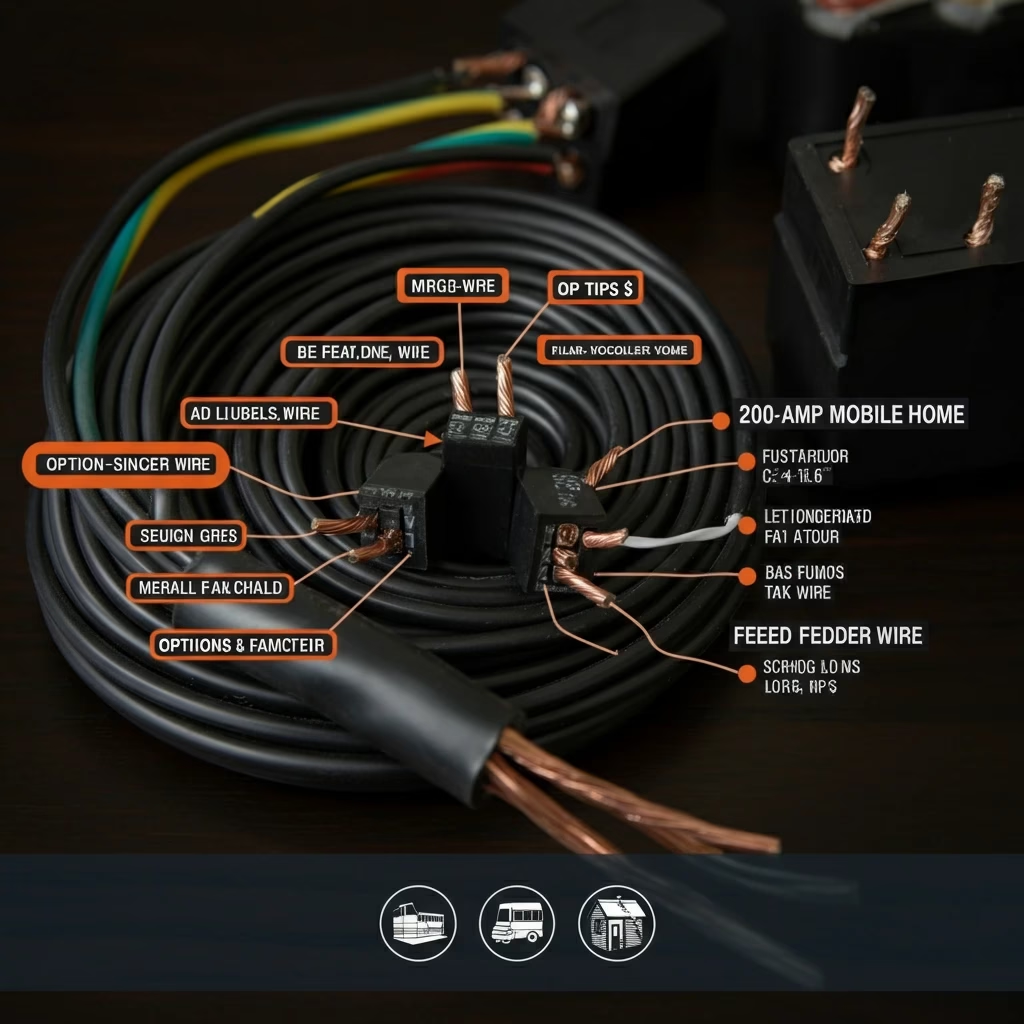200-Amp Mobile Home Feeder Wire – Options, Prices, and Tips
When it comes to powering your mobile home, choosing the right feeder wire is critical for ensuring safety and a reliable power supply. A 200-amp mobile home feeder wire is commonly used to deliver electricity to mobile homes efficiently and safely. However, with various types, materials, prices, and specifications to consider, making the right decision can feel overwhelming. This article will break everything down, explore different options, offer a handy comparison table, and answer common questions to help you make an informed choice.
Why Does Choosing the Right Feeder Wire Matter?
A feeder wire functions as the main power conduit between the electrical panel in your mobile home and the meter or main power source. Selecting the proper feeder wire for a 200-amp service ensures your home gets the electricity it needs without overloading or causing safety hazards. Whether you’re installing new wiring or upgrading from a 100-amp mobile home feeder wire, understanding the impacts of material type, load capacity, and installation requirements is key to a smooth and efficient electrical system.
Below, we’ll cover essential information on 4/0-4/0-2/0-4 aluminum mobile home feeder cables, copper and aluminum wiring options, and even the nuances of direct burial capabilities. If you’ve wondered, “Where can I find a 200-amp mobile home feeder wire near me?” or “What’s the 200-amp mobile home feeder wire price point?” you’re in the right place.
Comparing Copper vs. Aluminum Feeder Wires
One of the first decisions you’ll face is whether to go for copper or aluminum wire for your 200-amp mobile home feeder. Both materials have pros and cons, so the choice really depends on your priorities and circumstances.
Copper Feeder Wire
- Durability and Conductivity – Copper offers exceptional conductivity, allowing electricity to flow more efficiently with reduced resistance. It also withstands wear and tear better than aluminum over time.
- Price – While 200-amp mobile home feeder wire copper is reliable, it is generally more expensive. The higher cost might fit your budget if durability is your top priority.
- Corrosion Resistance – Unlike aluminum, copper doesn’t oxidize as easily, making it a popular choice in areas with high humidity or variable weather conditions.
Aluminum Feeder Wire
- Affordability – Aluminum wires, such as the 4/0-4/0-2/0-4 aluminum mobile home feeder cable, are significantly cheaper than their copper counterparts while still effectively handling large loads.
- Lightweight – Aluminum is lighter, which can make it easier to install and transport.
- Size Considerations – Aluminum requires a larger gauge compared to copper to match performance, meaning the wires will be slightly thicker.
Understanding the specific requirements for your power connection can help you decide whether copper or aluminum is best suited to your situation.
Is Mobile Home Feeder Wire Direct Burial?
“Is mobile home feeder wire direct burial?” is a frequently asked question by homeowners. The short answer is yes, but it depends on the type of wire used. Many mobile home feeder wires are rated for direct burial, provided they meet National Electric Code (NEC) standards. Direct burial wires are designed to be installed underground without the need for additional conduit, provided they are protected by durable insulation.
However, not all feeder wires are rated for direct burial, so it’s vital to check the product specifications or consult an electrician. Typically, aluminum wires like the 4/0-4/0-2/0 aluminum wire for 200 amps are commonly used in direct burial scenarios due to their resistance to corrosion and cost-effectiveness.
Table Comparing Popular Feeder Wire Options
The table below outlines key specifications and cost ranges for common feeder wire options to help you compare features.
| Wire Type | Application | Average Price Range |
|---|---|---|
| 100 Amp Mobile Home Feeder Wire | 100 amp service applications | $85 – $150 |
| 200 Amp Mobile Home Feeder Wire Copper | High durability and performance | $300 – $600+ |
| 4/0-4/0-2/0-4 Aluminum Wire 200 Amp | Affordable with strong performance | $200 – $450 |
| Mobile Home Feeder Wire 4/0 | Common for 200-amp services | $225 – $450 |
| 4/0 Aluminum Mobile Feeder Cable | Direct burial compatible | $200 – $400 |
| SER (Service Entrance) Copper Wire | Multiple applications | $400 – $700 |
| 4/0-4/0-2/0-4 Aluminum Mobile Home Feeder Cable | Underground and overhead use | $250 – $500 |
| Aluminum SEC Wire (200-Amp) | Economical and lightweight | $150 – $275 |
| Copper SEC Wire | Recommended for high-demand loads | $400 – $800 |
| URD (Underground Residential Distribution) Cable | Direct burial applications | $250 – $550 |
How to Use This Table Effectively
- Compare Prices and Applications – Note the difference in costs for copper vs. aluminum and decide which fits your budget and needs.
- Check Compatibility – Ensure the wire gauge matches your 200-amp service requirements.
- Confirm Material Ratings – If you’re planning underground installation, make sure the wire is rated for direct burial.
How to Determine the Right Feeder Wire for Your Mobile Home
Selecting the right 200-amp mobile home feeder wire involves assessing several factors, including load capacity, distance, and whether you need direct burial capabilities. Here are the steps to guide you:
- Calculate Total Load – A 200-amp service indicates the maximum electrical load supported, but always ensure the calculations match your household’s power needs.
- Consider Distance from Source – Aluminum wires work well over longer distances due to their lower cost and lighter weight. Copper, while more robust, can be pricey for extensive runs.
- Check Local Codes and Requirements – Always follow NEC guidelines and consult local codes. If in doubt, hire a licensed electrician.
- Shop Locally or Online – Searching for “200-amp mobile home feeder wire near me” can help you quickly locate available options at local stores.
Benefits of Upgrading from 100-Amp to 200-Amp Service
Many older mobile homes rely on a 100 amp Mobile Home Feeder Wire, which may no longer suffice for modern energy demands. Upgrading to a 200-amp service not only allows you to power more appliances but also future-proofs your home for additional electrical installations, such as central air conditioning or EV chargers.
Cost Implications
The 200 amp mobile home feeder wire price may seem like a significant upfront expense, but consider the long-term advantages. Aluminum options, like the 4/0-4/0-2/0 aluminum wire for 200 amps, provide an affordable upgrade path without compromising capacity. While copper is pricier, it offers increased durability and reliability for high-demand settings.
Common Questions About Mobile Home Feeder Wires
- Is the 4/0-4/0-2/0-4 Aluminum Mobile Home Feeder Cable Suitable for My Needs? Yes, provided your mobile home requires a 200-amp service and the wire is NEC-compliant.
- Where Can I Buy a 200-Amp Mobile Home Feeder Wire Near Me? Try local hardware stores, electrical supply shops, or online marketplaces for quick access.
- What’s the Difference Between Overhead and Underground Applications? Overhead installations may require additional insulation against weather conditions, while underground setups need direct burial-rated wires.
Final Thoughts
Investing in a high-quality 200-amp mobile home feeder wire is a crucial step in creating a safe and efficient power system for your home. Whether you opt for copper or aluminum, ensure the wire’s specifications fit your electrical demands, are within code, and are appropriate for your chosen installation method. Upgrading from a 100-amp mobile home feeder wire to a 200-amp capacity provides peace of mind and flexibility for future growth.
When searching for the perfect fit, consider your budget, the 200 amp mobile home feeder wire price, and whether you need features like direct burial capacity. The 4/0-4/0-2/0-4 aluminum mobile home feeder cable is a versatile and cost-effective option worth exploring. Compare all options carefully, shop around for the best deals, and always consult an electrician for professional advice.






